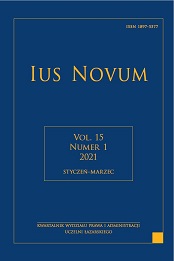Abstract
The article presents the assessment of the court practice of dealing with a motion to develop justification of a sentence lodged before a sentence has been passed. To that end, the normative material and the Supreme Court case law have been subject to critical interpretation. On the other hand, what provided the impulse to write this article was that the problem, which seemed to have been solved a long time ago, was referred to in the judgement of the European Court of Justice of 20 november 2018 in the case Witkowski v. Poland in the context of an individual’s right of access to a court protected by the Constitution and the Convention. The considerations presented in the article refer, inter alia, to irrelevance, inadmissibility and inefficiency of the application and, as a result, confirm the preliminary thesis that the court proceedings concerning a motion to develop justification of a sentence before it has been passed had been inappropriate. At the same time, the article provides a solution to the problem that consists in the assessment of the procedural step referred to in the title from the perspective of the moment when the decision on the matter is being taken and not the moment it was done. As a result, if at the time a motion to develop justification of a sentence lodged before a sentence has been passed is dealt with before a sentence has been passed, the step, as having no procedural significance, should only result in a technical activity of including the motion in the case files. However, in case a sentence subject to justification has been already passed, the issue of the moment when the motion was lodged is irrelevant to its admissibility. The above-mentioned solution is in conformity with the judgement of the European Court of Justice in the case Witkowski v. Poland.
References
Samborski E., Zarys metodyki pracy sędziego w sprawach karnych, Warszawa 2013.
Skorupka J. (red.), Kodeks postępowania karnego. Komentarz, Warszawa 2018.
Waltoś S., Hofmański P., Proces karny. Zarys systemu, Warszawa 2018.

